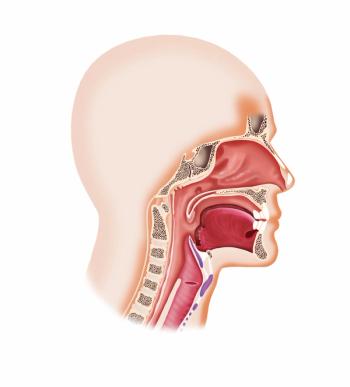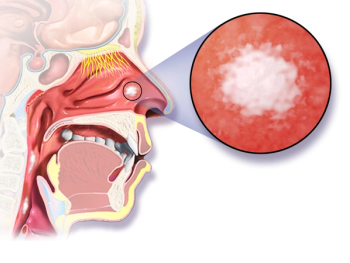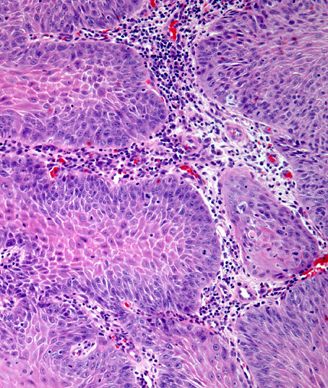
Head & Neck Cancer
Latest News

Latest Videos

CME Content
More News

Findings from a randomized clinical trial suggest that tele-cognitive behavioral therapy may help reduce body image distress among survivors of head and neck cancer.

The biologic license application for toripalimab plus chemotherapy for the treatment of recurrent or metastatic nasopharyngeal carcinoma is expected to be resubmitted by mid-summer 2023.

The new drug application for avasopasem for radiotherapy-induced severe oral mucositis in patients with head and neck cancer is supported by findings from the phase 3 ROMAN trial and phase 2b GT-201 trial.

Adjuvant capecitabine following concurrent chemoradiotherapy yielded higher failure-free survival rates compared with chemoradiotherapy alone in patients with locoregionally advanced nasopharyngeal carcinoma.

Induction chemotherapy combined with concurrent lobaplatin chemoradiotherapy improved safety outcomes without sacrificing efficacy vs a cisplatin-based regimen in patients with head and neck squamous cell carcinoma.

Results from the phase 2 NRG-HN004 trial found durvalumab plus radiotherapy did not show improved progression-free survival vs cetuximab in patients with locoregionally advanced head and neck cancer who had a contraindication to cisplatin.

Findings from a retrospective cohort study found that immune checkpoint inhibitors induced promising responses in the first- and second-line treatment of head and neck squamous cell carcinoma.

Findings from the phase 3 KEYNOTE-048 study indicated that long-lasting improved survival benefit can be achieved with pembrolizumab plus chemotherapy compared with cetuximab and chemotherapy in patients with recurrent or metastatic head and neck squamous cell carcinoma.

Incorporating tumor grade and histology into an externally validated modified salivary gland staging system improved hazard discrimination in patient subgroups.

CUE-101 alone or in combination with pembrolizumab was granted fast track designation by the FDA for patients with human papillomavirus 16–positive recurrent/metastatic head and neck squamous cell carcinoma.

Patients with stage IVA to IVB nasopharyngeal carcinoma experienced an improvement in failure-free survival following treatment with paclitaxel, cisplatin, and capecitabine for 2 cycles vs 2 cycles of cisplatin and fluorouracil.

Pembrolizumab plus chemoradiation did not meet statistically significant improvement in event-free survival for patients with locally advanced head and neck squamous cell carcinoma.

At the 5-year mark, overall survival was improved with xevinapant plus standard chemoradiotherapy vs matched placebo in locally advanced head and neck squamous cell carcinoma.

Patients undergoing complex oncologic surgery for head and neck cancer appeared to have shorter hospital stays when using a multiprofessional assessment and information day compared with those who did not.

A long-term data readout from the phase 3 IT-MATTERS trial highlighted the potential of leukocyte interleukin injection as a treatment for patients with locally advanced primary squamous cell carcinoma of the head and neck, oral cavity, and soft palate.

Findings from the planned futility interim analysis of the phase 3 INTERLINK-1 trial has led to the study’s termination after monalizumab and cetuximab did not meet efficacy end points in recurrent or metastatic squamous cell carcinoma in the head and neck.

Treatment with radiotherapy for head and neck cancer resulted in taste dysfunction during treatment and 3 months thereafter, although reduction in oral cavity intensity-modulated radiotherapy dose may result in early taste function recovery.

The phase 3 KEYNOTE-412 trial assessing pembrolizumab and consolidation chemoradiotherapy plus maintenance pembrolizumab in unresected locally advanced head and neck squamous cell carcinoma missed its primary end point of event-free survival improvement vs matched placebo.

Patients with low-risk locoregionally advanced nasopharyngeal carcinoma who received 2 cycles of concurrent cisplatin plus intensity-modulated radiotherapy compared with 3 cycles had better survival and manageable toxicities.

After receipt of a complete response letter in May 2022, a biologics license application for toripalimab monotherapy in the second line or later following platinum chemotherapy or in combination with chemotherapy in the first-line setting for advanced recurrent or metastatic nasopharyngeal carcinoma was resubmitted to and accepted by the FDA.

Fast track designation was granted to PDS0101 plus pembrolizumab, which is currently being assessed in the phase 2 VERSATILE study in patients with recurrent or metastatic human papillomavirus 16–positive head and neck cancer.

Despite an increased risk of grade 5 toxicities, patients with human papillomavirus–related oropharyngeal squamous cell carcinoma who received primary transoral surgery and neck dissection vs radiotherapy experienced good swallowing outcomes at 1 year.

Tom Thomas, MD, highlights how the stigma surrounding human papillomavirus–associated head and neck cancer is being unraveled through education and the importance of vaccination as a prevention strategy.

Based on results of the phase 3 RATIONALE-309 trial, the China National Medical Products Administration has approved tislelizumab plus chemotherapy for the first-line treatment of recurrent or metastatic nasopharyngeal cancer.

Results of the phase 3 RATIONALE-309 trial demonstrate efficacy of tislelizumab added to chemotherapy for recurrent or metastatic nasopharyngeal carcinoma.












































